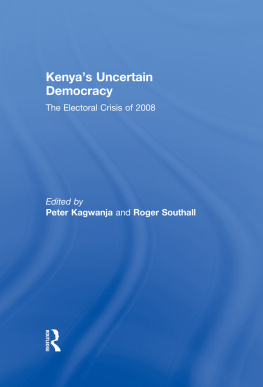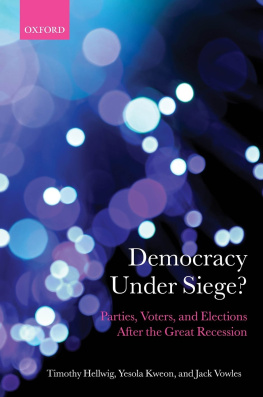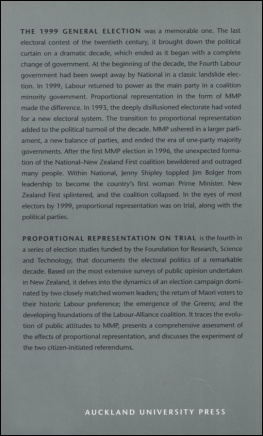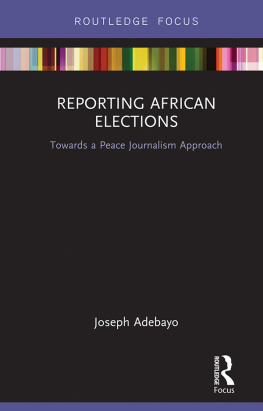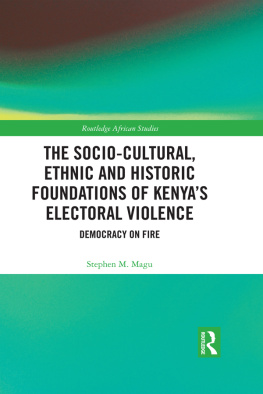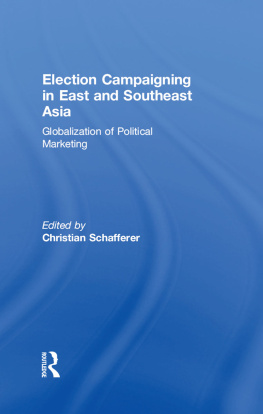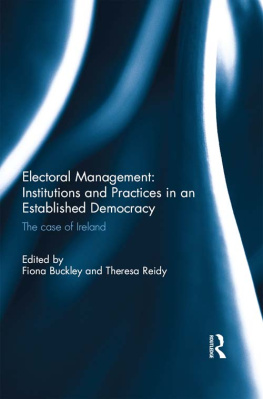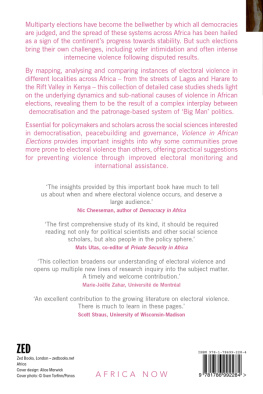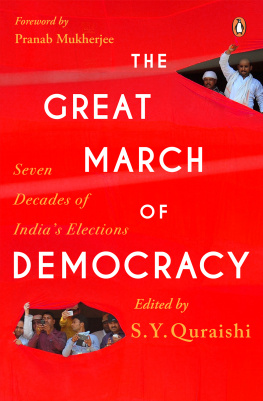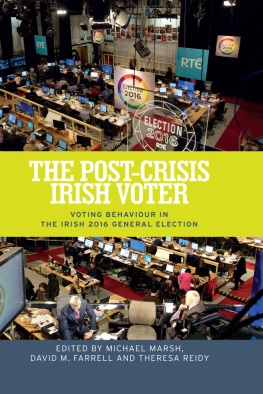Kenyas Uncertain Democracy
The plunging of Kenya, until recently a centre of stability and growth in East Africa, into political and economic uncertainty following the general election of December 2007 is regarded as a major cause for global and African concern. It is widely accepted that the elections were deeply flawed, and that there was electoral malfeasance by all the major players. President Kibakis rapid declaration of victory in the face of a heavily disputed election and his determination to hold on to the levers of state power precipitated a deadly crisis, communal violence and economic decline. A power-sharing deal between Kibaki and opposition leader, Raila Odinga signed in February seems to be holding, but Kenya ranks among the worlds growing number of democracies at risk.
This book takes a new look at the 2007 election, the post-election crisis, the underlying interaction of ethnicity, class and political power, forced displacement, the role of international forces, and the countrys power-sharing arrangement. The study will draw upon the expertise of a variety of leading experts on Kenya, and will be edited by Peter Kagwanja and Roger Southall. The overall project was based on a workshop in Nairobi on 67 December 2008.
This book was published as a special issue of the Journal of Contemporary African Studies.
Peter Kagwanja is President of the Africa Policy Institute and Research Fellow at the University of Pretoria, South Africa.
Roger Southall is editor of the Journal of Contemporary African Studies and Professor of Sociology at the University of the Witwatersrand, South Africa.
Kenyas Uncertain Democracy
The Electoral Crisis of 2008
Edited by Peter Kagwanja and Roger Southall
First published 2010 by Routledge
2 Park Square, Milton Park, Abingdon, Oxon, OX14 4RN
Simultaneously published in the USA and Canada
by Routledge
270 Madison Avenue, New York, NY 10016
Routledge is an imprint of the Taylor & Francis Group, an informa business
2010 Institute of Social and Economic Research
This book is a reproduction of the Journal of Contemporary African Studies, volume 27, issue 3. The Publisher requests to those authors who may be citing this book to state, also, the bibliographical details of the special issue on which the book was based
Typeset in Times by Value Chain, India
Printed and bound in Great Britain by TJI Digital, Padstow, Cornwall
All rights reserved. No part of this book may be reprinted or reproduced or utilised in any form or by any electronic, mechanical, or other means, now known or hereafter invented, including photocopying and recording, or in any information storage or retrieval system, without permission in writing from the publishers.
British Library Cataloguing in Publication Data
A catalogue record for this book is available from the British Library
ISBN10: 0-415-55042-4
ISBN13: 978-0-415-55042-0
CONTENTS
Peter Kagwanja and Roger Southall
Thomas P. Wolf
Marcel Rutten and Sam Owuor
Karuti Kanyinga
Prisca Mbura Kamungi
Peter Kagwanja
Stephen Brown
Monica Kathina Juma
Gilbert M. Khadiagala
Roger Southall
Stephen Brown is Associate Professor of Political Science at the University of Ottawa in Canada. His research focuses mainly on foreign aid, democratisation, political violence and post-conflict peacebuilding in sub-Saharan Africa. He has published on these topics in a number of scholarly journals and edited volumes.
Dr Monica Kathina Juma is Executive Director of Research at the Africa Institute of South Africa. Her research interests include Africas peace and security, governance and womens empowerment in the defence and security sectors. She has served on the UN secretary generals panel resourcing AU peacekeeping missions for a report discussed by the UN Security Council on 18 March 2009. Her publications include Compendium on key documents relating to peace and security in Africa (PULP 2006), and she co-edited with Astri Suhre, Eroding local capacity: Humanitarian action in Africa (African Nordic Institute 2002). She has also made numerous contributions to journals, books and research reports.
Dr Peter Mwangi Kagwanja is currently the President and Executive Director of the Africa Policy Institute (Nairobi) and Research Fellow in the Department of Political Science at the University of Pretoria, South Africa. Since 2006, Dr Kagwanja has served as an adviser to the Ministry of Foreign Affairs and policy consultant, cabinet office, Kenya.
Prisca Kamungi is a PhD candidate at the Forced Migration Studies Programme at the University of the Witwatersrand. She has researched and written extensively on internal displacement in Kenya and the Great Lakes region.
Karuti Kanyinga is a Senior Research Fellow at the Institute for Development Studies at the University of Nairobi in Kenya. His research work focuses on the politics of development in Kenya. He has carried out research and published extensively on the politics of land rights in Kenya as well as on ethnic inequalities, governance and development in Kenya.
Gilbert M. Khadiagala is Jan Smuts Professor of International Relations and Head of Department at the University of the Witwatersrand, Johannesburg. He recently authored Meddlers or mediators? African interveners in civil conflicts in Eastern Africa. Leiden: Brill (2007); and Sudan: The elusive quest for peace (with Ruth Iyob). Boulder, CO: Lynne Rienner (2006). His current research interests include leadership in post-conflict Africa and peacemaking in Kenya.
Sam Owuor is a senior lecturer in Urban Geography in the Department of Geography at the University of Nairobi in Kenya. He has published in Geoforum and Development Southern Africa, and contributed chapters to a number of book collections. He is the author of Bridging the urban-rural divide: Multi-spatial livelihoods in Nakuru town, Kenya (2006). He is also an affiliate researcher at the African Studies Centre in Leiden, the Netherlands, and at the French Institute of Research in Africa the Nairobi.
Marcel Rutten is a geographer at the African Studies Centre in Leiden, the Netherlands. He was staff co-ordinator of the Election Observation Centre, the co-ordinating centre of the Western missions during the 1997 general elections in Kenya. He has published mainly on land tenure and on Kenyan politics. He is author of Selling wealth to buy poverty (1992) and co-editor (with A. Leliveld and D. Foeken) of Out for the count (2008).
Roger Southall is Professor of Sociology at the University of the Witwatersrand and formerly Professor of Political Studies at Rhodes University. He has published widely on African and South African affairs, including various articles on Kenya. He is editor of the Journal of Contemporary African Studies and recently with John Daniel, Zunami! The South African General Elections of 2009 (Johannesburg, Jacana).
Thomas P. Wolf (DPhil in Comparative Politics, University of Sussex) is an independent consultant in Nairobi, having undertaken assignments for the Ford Foundation, Transparency International, UNDP and DANIDA among other agencies, but is best known for his association with the Steadman (now Synovate) Groups opinion survey work. Earlier he taught at the University of Nairobi, and served as Democracy/Governance Adviser for USAID/Kenya. His published works include Immunity or accountability?: Daniel Toroitich arap Moi, Kenyas first retired president in

